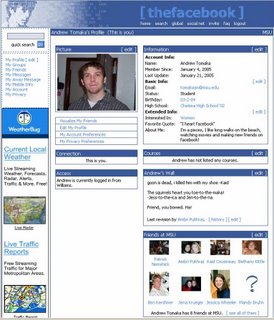
One student chose a picture of himself shirtless holding a Miller Lite can for his profile photo. He's on the baseball team.
Another belongs to the "My cell phone is my best friend when I'm drunk in Kent" group and lists skinny-dipping as an interest. She competes in track and field.
Both are Kent State University athletes with profiles on Facebook.com, a social networking Web site that boasts more than 7.5 million users from high schools and universities nationwide.
But soon, Kent State's nearly 400 athletes will be banned from Facebook -- not by the Web site, but by university administrators.
Athletics Director Laing Kennedy recently told student-athletes they have until Aug. 1 to remove their Facebook profiles, citing a need to protect both their identities and the university's image.
"We're really concerned about the safety of our student-athletes and some of the personal information some of them have on there," he said.
Many universities also warn students against putting personal information on such online sites out of concern that it makes them targets for predators, and some schools review the sites for evidence of wrongdoing.
Kennedy said some Kent students who list phone numbers and addresses have been contacted inappropriately, either by strangers or sports agents.
Although Kennedy said he regrets limiting the students' ability to communicate, he sees it as a necessary step.
"It would be irresponsible on our part if this led to something serious," he said.
The move to ban the site came from students and coaches expressing concern over safety and privacy issues. Kennedy said he hasn't seen the site.
If student-athletes don't remove their profiles by the deadline, they risk losing their scholarships, he said. Coaches and athletics counselors will monitor the site for violators.
The ban presents some First Amendment concerns, said Gary Daniels, spokesman for the American Civil Liberties Union of Ohio.
Many high schools and colleges prohibit the consumption of alcohol during a sports season, which makes sense, he said.
But this is a different story.
"There's no clear connection between their roles as athletes and their use of these Web sites," Daniels said.
"For the government to say that you can't engage in First Amendment activities, they better have a really good reason. And saying, 'I don't want them to do it' is not a good-enough reason."
Student-athletes are representatives of the university, Kennedy said, and anything embarrassing on a student's profile can be embarrassing for the university as well.
"The expectations of a student-athlete are significantly higher than if you are an ordinary student," Kennedy said.
Most students have responded to the ban positively, Kennedy said.
Other universities have expressed concern with Facebook but have taken different steps.
Miechelle Willis, senior associate athletics director for Ohio State, said that university doesn't have a policy.
It instead engages coaches and student-athletes in talks of what is and isn't appropriate for networking sites.
"We're trying not to implement a policy where students have to remove their pages and instead using it as an educational opportunity," she said.
Greg Seibert, director of security and compliance for Kent State, said all students, not just athletes, face safety issues with networking sites.
By posting their addresses, class schedules and what bars they go to, they put themselves at risk, he said.
"That's pretty much a blueprint if you want to stalk me," he said.
Resident advisers at Ohio State review Facebook to see what their residents are doing behind closed doors, said Steve Kremer, assistant vice president for student affairs.
In a handful of occasions, he said, some students have been investigated by police based on their profiles.
In one instance, he said, a group of students was caught after posting a photo of themselves with stolen property.
Police at other universities have staked out parties and other illegal activities through the site.
Businesses are also checking out students' Facebook and Myspace profiles when considering a new hire.
For that reason, some information is best left off the sites, Kent State's Seibert said.
"If you go on and on about the times you were stoned out of your mind or drunk driving, and an employer sees that … you might not get the job," he said.
Erin Evans, a recruiter at the Worthington office of Act-I, a local staffing company, said it doesn't look at the Facebook profiles of potential hires.
But she stressed the importance of excluding information employers wouldn't want to see.
"Anyone can Google you and find many different things," she said. "The Internet is open for everybody."